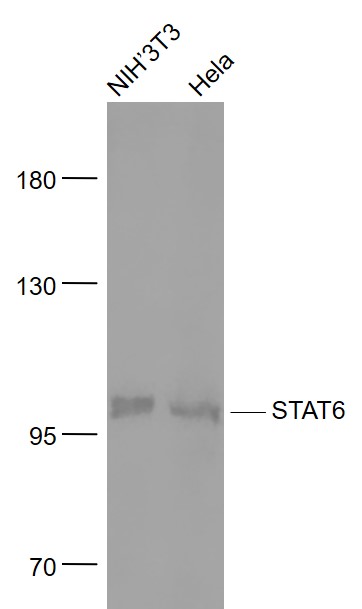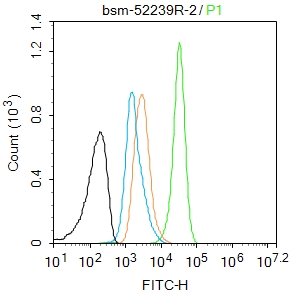
Rabbit Anti-STAT6 antibody
signal transducers and activators of transduction 6; D12S1644; IL 4 STAT; IL4 STAT; Interleukin 4 Induced; Interleukin 4 Induced Transcription Factor IL4 STAT; Signal Transducer And Activator Of Transcription 6 Interleukin 4 Induced; Signal Transducer And
View History [Clear]
Details
Product Name STAT6 Chinese Name Signal transduction和转录激活因子6Recombinant rabbit monoclonal anti Alias signal transducers and activators of transduction 6; D12S1644; IL 4 STAT; IL4 STAT; Interleukin 4 Induced; Interleukin 4 Induced Transcription Factor IL4 STAT; Signal Transducer And Activator Of Transcription 6 Interleukin 4 Induced; Signal Transducer And Activator Of Transcription 6 Nirs Variant 1; STAT 6; STAT interleukin4 induced; STAT6B; STAT6C; Transcription factor IL 4 STAT. literatures Research Area Tumour Developmental biology Signal transduction Apoptosis transcriptional regulatory factor Epigenetics Immunogen Species Rabbit Clonality Monoclonal Clone NO. 9A7 React Species Human, Mouse, Applications WB=1:500-1000 IHC-P=1:100-500 IHC-F=1:20-200 Flow-Cyt=2ug/Test ICC=1:20-200 IF=1:20-200 (Paraffin sections need antigen repair)
not yet tested in other applications.
optimal dilutions/concentrations should be determined by the end user.Theoretical molecular weight 94kDa Cellular localization The nucleus cytoplasmic Form Liquid Concentration 1mg/ml immunogen Recombinant human STAT6 protein, around 700-800aa Lsotype IgG Purification affinity purified by Protein A Buffer Solution 0.01M TBS(pH7.4) with 1% BSA, 0.03% Proclin300 and 50% Glycerol. Storage Shipped at 4℃. Store at -20 °C for one year. Avoid repeated freeze/thaw cycles. Attention This product as supplied is intended for research use only, not for use in human, therapeutic or diagnostic applications. PubMed PubMed Product Detail The protein encoded by this gene is a member of the STAT family of transcription factors. In response to cytokines and growth factors, STAT family members are phosphorylated by the receptor associated kinases, and then form homo- or heterodimers that translocate to the cell nucleus where they act as transcription activators. This protein plays a central role in exerting IL4 mediated biological responses. It is found to induce the expression of BCL2L1/BCL-X (L), which is responsible for the anti-apoptotic activity of IL4. Knockout studies in mice suggested the roles of this gene in differentiation of T helper 2 (Th2) cells, expression of cell surface markers, and class switch of immunoglobulins.
Function:
Carries out a dual function: signal transduction and activation of transcription. Involved in interleukin-4 signalling.
Subunit:
Forms a homodimer or a heterodimer with a related family member. Interacts with NCOA1 via its C-terminal LXXLL motif.
Subcellular Location:
Cytoplasm. Nucleus. Translocated into the nucleus in response to phosphorylation.
Post-translational modifications:
Tyrosine phosphorylated following stimulation by IL-4 and IL-3.
Similarity:
Belongs to the transcription factor STAT family.
Contains 1 SH2 domain.
SWISS:
P42226
Gene ID:
6778
Database links:Entrez Gene: 6778 Human
Entrez Gene: 20852 Mouse
Omim: 601512 Human
SwissProt: P42226 Human
SwissProt: P52633 Mouse
Unigene: 524518 Human
Unigene: 121721 Mouse
Unigene: 6880 Rat
Product Picture
NIH/3T3(Mouse) Cell Lysate at 30 ug
Hela(Human) Cell Lysate at 30 ug
Primary: Anti- STAT6 (SLM-52239R) at 1/1000 dilution
Secondary: IRDye800CW Goat Anti-Rabbit IgG at 1/20000 dilution
Predicted band size: 94 kD
Observed band size: 100 kD
Blank control:MCF7.
Primary Antibody (green line): Rabbit Anti-Phospho-Akt1(Ser473) antibody (SLM-52130R)
Dilution: 2μg /10^6 cells;
Isotype Control Antibody (orange line): Rabbit IgG .
Secondary Antibody : Goat anti-rabbit IgG-AF488
Dilution: 1μg /test.
Protocol
The cells were fixed with 4% PFA (10min at room temperature)and then permeabilized with 90% ice-cold methanol for 20 min at-20℃. The cells were then incubated in 5%BSA to block non-specific protein-protein interactions for 30 min at room temperature .Cells stained with Primary Antibody for 30 min at room temperature. The secondary antibody used for 40 min at room temperature. Acquisition of 20,000 events was performed.Blank control:MCF7.
Primary Antibody (green line): Rabbit Anti-Phospho-Akt1(Ser473) antibody (SLM-52130R)
Dilution: 2μg /10^6 cells;
Isotype Control Antibody (orange line): Rabbit IgG .
Secondary Antibody : Goat anti-rabbit IgG-AF488
Dilution: 1μg /test.
Protocol
The cells were fixed with 4% PFA (10min at room temperature)and then permeabilized with 90% ice-cold methanol for 20 min at-20℃. The cells were then incubated in 5%BSA to block non-specific protein-protein interactions for 30 min at room temperature .Cells stained with Primary Antibody for 30 min at room temperature. The secondary antibody used for 40 min at room temperature. Acquisition of 20,000 events was performed.
References (0)
No References
Bought notes(bought amounts latest0)
No one bought this product
User Comment(Total0User Comment Num)
- No comment




 +86 571 56623320
+86 571 56623320
 +86 18668110335
+86 18668110335

